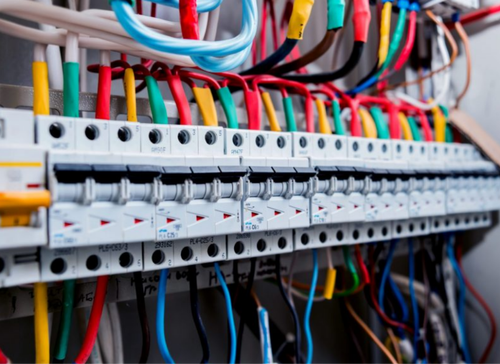Dependable and Expert BRE Electrical Services for each Task
Dependable and Expert BRE Electrical Services for each Task
Blog Article
Debunking Electrical Installation: Understanding Codes and Regulations for a Lawful and Safe Arrangement
In the world of electric installation, adherence to codes and laws is critical to ensure both legitimacy and safety and security. The journey to demystifying electric installation goes beyond simple knowledge with regulations; it requires an extensive grasp of exactly how to carry out secure electrical methods properly.
Importance of Electrical Codes
The adherence to electric codes is essential in ensuring the safety and security and reliability of electric installments. Electrical codes serve as a collection of criteria and guidelines that dictate the proper style, setup, and upkeep of electric systems. These codes are developed to decrease the risk of electric risks, fires, and various other safety and security problems that might arise from defective electrical work.

Additionally, electric codes are consistently updated to integrate new technologies, finest practices, and precaution. Remaining updated with these codes is essential for professionals in the electrical sector to guarantee that their job meets the current security standards. Ultimately, the value of electric codes hinges on developing a secure and efficient electric infrastructure that benefits both people and communities.
Secret Rules for Safety
A number of basic guidelines govern the security criteria in electric installations. One essential law is the National Electrical Code (NEC), which offers standards for safe electrical style, installment, and assessment to shield people and residential property from electric threats. The NEC covers aspects such as electrical wiring approaches, grounding, overcurrent protection, and equipment installation to guarantee a secure electrical system.
One more vital law is the Occupational Safety and Health And Wellness Management (OSHA) criteria, which concentrate on the safety and security of workers included in electrical installments (BRE Services). OSHA policies consist of demands for appropriate training, safety and security treatments, and individual safety equipment to avoid workplace mishaps and injuries
In Addition, the International Electrotechnical Compensation (IEC) requirements aim to balance electrical installment regulations on an international scale. These standards address concerns like electrical equipment safety and security, electromagnetic compatibility, and power performance to promote harmony and security in electrical installments worldwide.
Compliance with these vital guidelines is vital to guarantee the safety and legitimacy of electrical setups, safeguarding both people and residential property from the threats linked with electrical power.
Recognizing National Electric Code
Secret laws such as the National Electrical Code (NEC) give vital standards for risk-free electric design, installment, and evaluation to make certain the protection of people and home from electric risks. The NEC, also referred to as NFPA 70, is an extensive collection of standards for electrical installments that are updated every three years. It is established by the National Fire Defense Association (NFPA) and is widely embraced throughout the USA.
The NEC covers different elements of electric job, including electrical wiring approaches, grounding, overcurrent protection, and equipment setup. It intends to guard people and building by attending to possible threats connected with electrical systems. Compliance with the NEC is usually implemented by neighborhood authorities having jurisdiction (AHJs), such as constructing code authorities and assessors.
Understanding the NEC is essential for electrical specialists, developers, and assessors to make certain that installations meet the required security demands. By sticking to the NEC standards, specialists can help prevent electrical mishaps and guarantee the dependability of electrical systems in domestic, industrial, and industrial settings.

Conformity With Regional Building Codes
Understanding and sticking to local building regulations is necessary for making sure the safety and conformity of electrical setups within a specific territory (BRE Automation Australia). Neighborhood building regulations differ from one town to an additional, and they are established to protect the health of owners and properties. These codes lay out particular needs for electric setups, such as the sort of wiring to be utilized, positioning of electrical outlets, grounding techniques, and lots capacities. By following neighborhood building codes, electrical experts can ensure that installations are done BRE Electrical properly and fulfill the necessary security criteria.
When it involves electric installments, failing to abide by neighborhood building regulations can cause significant consequences. Non-compliant installations may present security risks, enhance the threat of electrical fires, and result in expensive penalties or lawful problems. Furthermore, insurer might decline to cover damages resulting from installations that do not fulfill local building regulations needs. For that reason, it is critical for electricians and contractors to remain notified about and strictly abide by the regional building regulations applicable to their jobs.
Ensuring Safe Electric Practices
Exercising stringent adherence to developed security procedures is important in the field of electrical installments to alleviate prospective risks and ensure the health of people and properties. Safety and security in electric work encompasses numerous elements, starting with the correct training of employees included in setup, upkeep, and fixing. By prioritizing risk-free methods, electrical installments can work efficiently while decreasing the possibility of accidents or damages.
Conclusion
To conclude, adherence to electrical codes and laws is critical for making sure the safety and validity of electric installments. Understanding the National Electric Code and conformity with local building regulations are essential for a risk-free setup. By following these guidelines and exercising risk-free electrical techniques, individuals can avoid potential dangers and guarantee the proper functioning of their electric systems.
Report this page